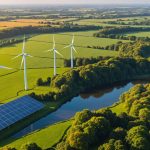Overview of UK Clean Energy Landscape in 2024
The UK’s clean energy landscape has significantly evolved, marking a notable shift in its energy framework. Historically, the reliance on coal and other fossil fuels defined the UK’s energy profile. However, a determined push for energy transition has fostered a burgeoning reliance on renewable sources. This transformation aligns with global sustainability goals and efforts to curb carbon emissions.
In 2024, the UK’s renewable energy matrix primarily features wind and solar power. Offshore wind farms have become a pivotal component, offering substantial energy contributions. Solar energy, while more modest, also supports the grid’s decarbonisation efforts. The integration of tidal and biomass energy projects further diversifies the portfolio.
Also to read : Discover the Game-Changing Trends Shaping the Future of Renewable Energy in the UK
Transitioning to a low-carbon economy is crucial for the UK, as it seeks to reduce its carbon footprint. The emphasis on renewable sources not only underscores the commitment to environmental sustainability but also bolsters energy security. The energy transition plays a pivotal role in meeting international climate commitments, such as the Paris Agreement, which drives both policy formation and innovation in clean energy technologies. The UK’s approach serves as a guiding model globally, promoting an interplay between sustainable development and economic growth.
Key Economic Drivers of The Clean Energy Revolution
The UK clean energy market is witnessing dynamic growth, largely propelled by strategic economic factors. Notably, government incentives play a critical role by providing financial support for renewable technologies. These incentives, which include tax breaks and subsidies, significantly lower the cost barriers for companies to invest in clean energy solutions.
Topic to read : Discover the Game-Changing Trends Shaping the Future of Renewable Energy in the UK
The private sector has embraced this transformation, with significant trends in investment emerging. Venture capital firms are increasingly directing resources towards clean energy startups. This surge in private capital not only fosters innovation but also accelerates the deployment of cleaner technologies across the energy landscape.
Moreover, job creation is a significant economic driver in incentivising clean energy initiatives. With the expanding clean energy market, new employment opportunities arise, contributing to economic growth. Roles are proliferating within areas like renewable energy manufacturing, installation, and maintenance, which in turn support broader economic stability.
In conclusion, the collaboration between government and private sectors, backed by robust economic factors, is pivotal in sustaining the clean energy revolution in the UK. This paradigm supports the economy while advancing the transition to a more sustainable energy framework.
Technological Innovations Shaping The Future of Energy
In the rapidly evolving landscape of energy, clean energy technology plays a pivotal role in the journey towards sustainability. Innovations in this field focus on enhancing energy efficiency, reducing costs, and increasing the adoption of renewable sources.
Advances in Renewable Energy Technologies
Recent breakthroughs in solar and wind energy technologies have significantly increased their efficiency and viability. Solar panels are now more effective in converting sunlight into electricity, while advancements in wind turbine design allow for higher energy output at lower wind speeds. These innovations are crucial in making renewables economically competitive.
Energy Storage Solutions
Energy storage systems are vital for ensuring grid reliability. Advanced battery technologies, like lithium-ion and emerging solid-state batteries, offer higher capacities and longer lifespans. These solutions are critical in balancing supply and demand, allowing for the storage of excess power generated during peak renewable production periods for later use.
Smart Grid Developments
Smart grid systems represent a transformative leap in energy management. By integrating digital technology, smart grids can monitor and optimize energy flow, resulting in improved efficiency and reduced wastage. They enable consumers to have greater control over their energy consumption, fostering a more sustainable energy market.
Government Policy and Regulatory Framework
The UK’s energy policy landscape in 2024 is shaped by government initiatives aimed at accelerating the energy transition. Significant policies include subsidies for renewable infrastructure projects and stringent regulations on carbon emissions. These measures are pivotal in promoting renewable sources over traditional fossil fuels, thereby fostering a sustainable energy ecosystem.
Regulations have dramatically influenced the pace of transitioning to cleaner energy by mandating reductions in industrial carbon emissions and compelling energy firms to integrate sustainable practices. These regulations enforce compliance through a mix of penalties and incentives, ensuring adherence while catalysing innovation in cleaner technologies.
Moreover, the UK’s energy strategy is heavily influenced by international agreements like the Paris Agreement, which set ambitious targets for carbon neutrality. These commitments are integral in aligning national policies with global standards, underscoring the UK’s role in combating climate change. They serve as benchmarks for progress in clean energy initiatives.
Such policies and regulatory frameworks not only support the clean energy market but also exemplify the UK’s dedication to reducing its carbon footprint, establishing a model for other nations to emulate. Through sustained initiatives, the government continues to reinforce a robust, sustainable energy future.
Environmental Considerations Driving Clean Energy Adoption
In the UK, environmental impact and the drive for sustainability are pivotal in propelling clean energy adoption. The transition to increased renewable sources significantly reduces carbon emissions, mitigating adverse effects on the climate. This alignment with ecological priorities not only benefits the environment but also supports public health by diminishing air pollutants.
Urgency to Combat Climate Change
The threat of climate change necessitates immediate policy interventions to curb its impacts. As the UK commits to stringent targets under the Paris Agreement, there is a marked influence on energy transition strategies. These commitments compel nations to accelerate the shift from fossil fuels toward sustainable energy solutions with reduced carbon footprints.
Successful Environmental Initiatives
Highlighted within the UK are case studies that showcase exemplary environmental initiatives leading to clean energy innovations. Projects like the development of offshore wind farms illustrate how leveraging natural resources can result in sustainable electricity generation. Through these efforts, the UK demonstrates a tangible reduction in its carbon footprint, setting a benchmark for similar global initiatives.
Ultimately, understanding and integrating these environmental considerations are essential for ensuring a resilient and sustainable clean energy future. As these elements drive renewable energy policies, they cement the UK’s leadership role in the ongoing battle against climate change.
Market Dynamics Influencing Energy Choices
Understanding the energy market dynamics is crucial as it shapes the UK’s transition to renewable sources. The supply chain has evolved significantly, enhancing access to clean energy. Developments in logistics and technology have streamlined the distribution of renewable technology components. This change ensures a more efficient supply line, supporting the broader energy transition and enabling quicker deployment of new technologies.
Consumer behaviour is also a pivotal force in driving sustainable energy choices. More individuals and businesses are prioritising environmentally friendly options, boosting demand for renewable energy. This shift is aided by increased awareness of sustainability issues and the tangible benefits of reduced energy costs over time.
In terms of cost competitiveness, renewable energy has become more viable compared to fossil fuels. Declining costs in solar and wind technologies have made these options attractive, particularly as government incentives help offset initial investment requirements. This trend is pivotal in ensuring that renewable sources become integral to the energy mix.
These combined factors highlight how adapting to market dynamics can advance the UK’s clean energy landscape, fostering an economic and environmental shift from traditional energy reliance.
Case Studies of Successful Clean Energy Projects
Examining clean energy projects throughout the UK reveals profound successes and offers a roadmap for future initiatives. An exemplary project is the Hinkley Point C Nuclear Power Station, with an innovative use of nuclear energy supporting decarbonisation goals. By delivering low-carbon electricity, it sets a precedent for integrating traditional energy within a renewable-focused landscape.
In the field of wind energy, the Hornsea One Offshore Wind Farm stands out as a groundbreaking accomplishment. It currently ranks as one of the largest operational offshore wind farms globally, supplying clean energy and reducing reliance on fossil fuels. Its efficient deployment illustrates strategic project management and resource utilisation, offering valuable lessons learned.
On the solar energy front, the Shotwick Solar Park demonstrates effective best practices. As the largest solar park in the UK, its cooperative model exemplifies how community and commercial interests can align for sustainability. This synergy not only addresses environmental concerns but also fosters economic resilience, setting a template for future implementations.
Overall, these successful initiatives showcase the UK’s potential for clean energy leadership, highlighting how projects can overcome challenges to become sustainable and replicable in other regions.
Expert Insights and Future Predictions
Exploring the future of the clean energy sector requires the insights of industry experts and their predictions for upcoming trends. Experts anticipate significant advancements in clean energy technology, driven largely by ongoing innovations and substantial investment trends. The focus is shifting toward enhanced efficiencies and emerging technologies that promise to make renewable energy more accessible and affordable.
With continuous strides in solar and wind technologies, experts forecast a greater energy transition that positions the UK as a leader in sustainable energy. This transition is bolstered by an expanding marketplace and receptive consumer behavior favoring green solutions. Industry authorities predict that the integration of AI and blockchain will further optimise energy distribution and consumption, facilitating smarter grid solutions.
Potential challenges, however, can’t be overlooked. Regulatory hurdles and fluctuating economic conditions could stall momentum. Yet, the UK’s robust policy framework and commitment to international agreements offer a solid foundation for overcoming these obstacles. Opportunities abound in the development of energy efficiency solutions and storage technologies, which are critical to handling supply and demand variations in a renewable-driven grid.
As we march toward a cleaner future, these expert insights underscore the vast potential of a rapidly evolving energy landscape.











